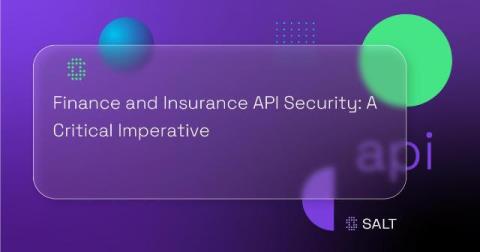Security | Threat Detection | Cyberattacks | DevSecOps | Compliance
%term
Finance and Insurance API Security: A Critical Imperative
API security is a critical concern for industries that are undergoing digital transformation. Financial services and insurance sectors are particularly vulnerable due to the increasing number of APIs they need to manage. As early adopters of digitalization, these sectors face unique challenges requiring a customized API security approach.
What is a virtual CISO (vCISO) and should you have one on your team?
Most people know what a chief information security officer (CISO) is and how they’re essential to improving an organization’s security posture. The problem is that many organizations have limited hiring resources and it makes little sense to appoint an in-house CISO without tangible ROI. A virtual CISO or vCISO becomes an excellent solution for organizations that need to enhance their security framework within resource constraints.
CIS Control 17: Incident Response Management
We all know that it is a question of when you will be compromised and not if you will be compromised. It is unavoidable. The goal of CIS Control 17 is to ensure that you are set up for success when that inevitable breach occurs. If an organization is neither equipped nor prepared for that potential data breach, they are not likely to succeed in responding to the threat.
The Importance of Layered Cybersecurity Solutions
The threat of cyberattacks is at an all-time high. In fact, research shows that worldwide cybercrime costs are anticipated to reach $10.5 trillion annually by 2025. Cybercriminals threaten all, as 43% of cyberattacks target small enterprises. The rise of these threats underscores the importance of a robust cyber defense strategy, and one key way to do that is through layered cybersecurity solutions.
The Number of Malicious Emails Reaching Inboxes Is Declining
New research shows that less malicious emails are getting past security scanners to the inbox, but also provides details about how phishing emails are becoming increasingly dangerous. So much of our training is centered around elevating the employee’s state of cyber awareness so that when they do come across that sketchy email or that too good to be true web page, they know better. But it’s only one part of a larger cybersecurity effort within an organization.
KnowBe4 Named a Leader in the Fall 2024 G2 Grid Report for Security Orchestration, Automation, and Response (SOAR) Software
We are excited to announce that KnowBe4 has been named a leader in the Fall 2024 G2 Grid Report for Security Orchestration, Automation, and Response (SOAR) for the PhishER platform for the 14th consecutive quarter! The latest G2 Grid Report compares Security Orchestration, Automation, and Response (SOAR) Software vendors based on user reviews, customer satisfaction, popularity and market presence. Based on 318 G2 customer reviews, KnowBe4’s PhishER platform is the top ranked SOAR software.
GraphQL Security Breach: How 30 Million Accounts Were Hacked #hacked #databreach #graphql #api
In this video, we explore a real-world example of a GraphQL exploit that exposed 30 million user accounts to attackers. Learn how vulnerabilities in GraphQL led to access token generation and account takeovers, and what this means for API security.
Threat Hunting in macOS with the SecOps Cloud Platform
The second most popular OS in today’s business environment, macOS, is often neglected in cybersecurity discussions. This is likely due to Windows OS holding a dominant share (72.1%) of the global workstation market and Linux (4.03%) running critical parts of IT infrastructure. This often leaves macOS excluded from the conversation.
What Is a Rainbow Table Attack and How to Prevent It?
Most computer systems and applications use passwords as a common authentication method. The simplest way to implement authentication is to store a list of all valid passwords for each user. The downside of this method is that if the list is compromised, the attacker will know all the user passwords. A more common approach is to store the cryptographic hash value of the password phrase.











